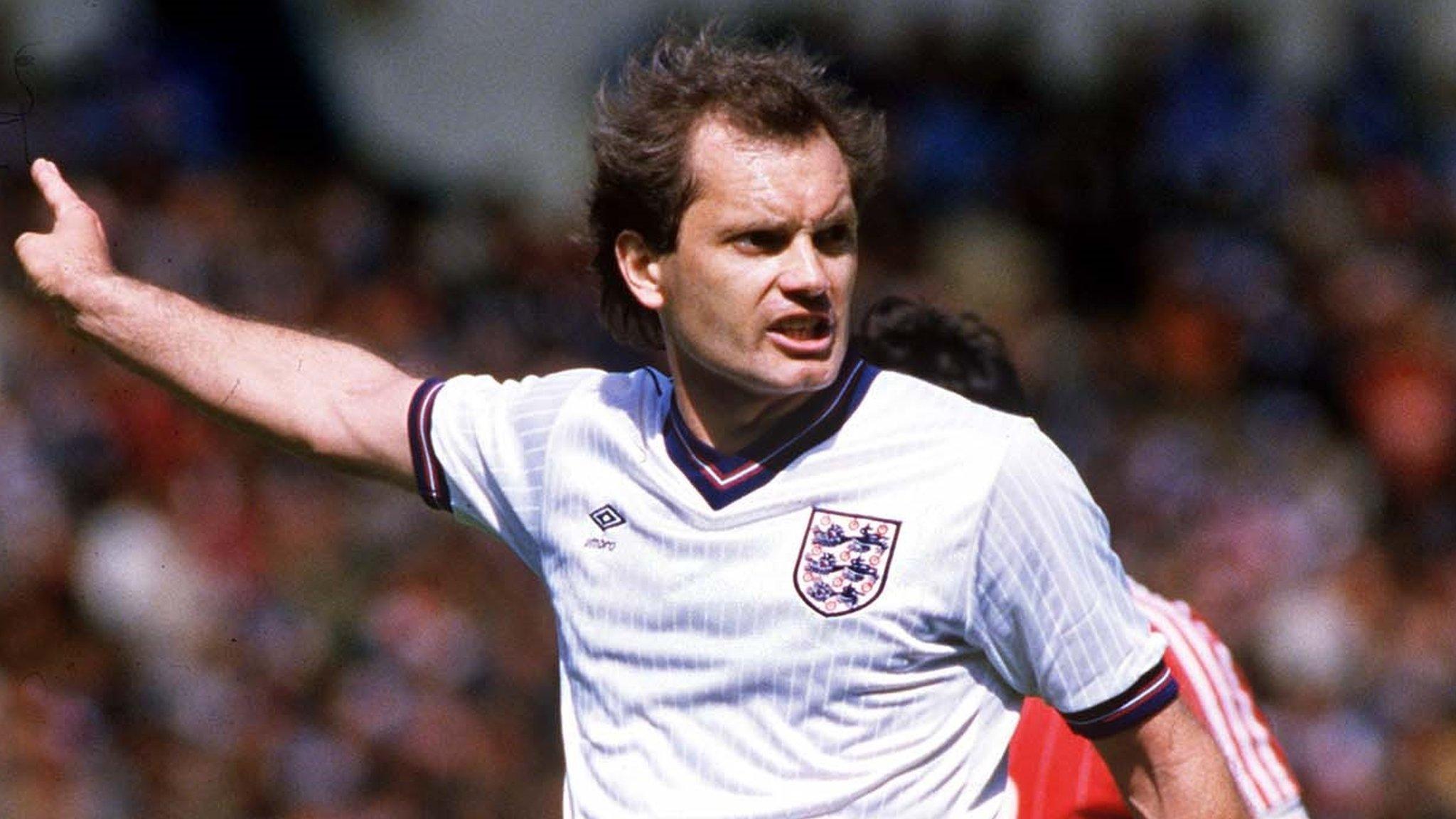Ray Wilkins: From Mexico to Milan, football says goodbye to 'an absolute gentleman'
- Published
- comments
Ray Wilkins dies aged 61: 'One of the best players of his generation'
Ray Wilkins, who has died aged 61, was one of the most enduring and popular figures of the modern footballing generation.
Wilkins had a successful and nomadic playing career, captaining England on 10 occasions while winning 84 caps and representing clubs of the stature of Chelsea, Manchester United, AC Milan, Paris St-Germain and Rangers with distinction.
He always maintained his closest links with boyhood club Chelsea, serving as a trusted and loyal lieutenant to several managers during the latter years of glory at Stamford Bridge.
From teenage prodigy to Old Trafford
Wilkins' career was characterised by maturity and dignity, which was recognised early in his time at Chelsea, where he made his debut as a 17-year-old in October 1973 before being awarded the captaincy at just 18 by then manager Eddie McCreadie.
He went on to make his England debut in the Bicentennial Tournament against Italy in New York City in May 1976 and had a burgeoning reputation as one of the young pin-up boys of English football as well as one of its most promising talents.
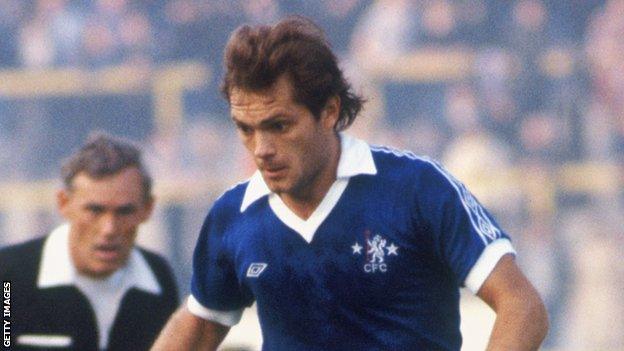
Wilkins scored 30 league goals for Chelsea before moving to Old Trafford in 1979
Wilkins - who picked up the nickname 'Butch' in his early career - led a group of emerging Chelsea youngsters back into the top flight, but once they were relegated again it became inevitable that top-flight clubs would pounce. So it proved as he signed for Manchester United for a fee reported in some quarters to be £777,777 but rounded up to £800,000 in others in August 1979.
He acquired an unfair reputation for a conservative playing style, with one cruel nickname of 'The Crab' mocking his supposed preference for sideways passes.
Those who actually played with Wilkins thought differently and spoke of an elegant, visionary midfield player and leader whose abilities were underrated, as evidenced by the calibre of clubs who were always keen to secure his services.
Manchester United, up against the great Liverpool side of the late 70s and early 80s, were unable to bring the title back to Old Trafford but Wilkins enjoyed his finest personal moment at the club with the 1983 FA Cup win against Brighton and Hove Albion at Wembley.
And he is best remembered for a brilliant goal in the original 2-2 draw at Wembley, turning inside before curling a magnificent left-foot finish beyond the diving Brighton keeper Graham Moseley.
Wilkins continued to be a regular member of United's midfield alongside England team-mate Bryan Robson before moving to AC Milan in the summer of 1984.
The football nomad
The move to Serie A with AC Milan began a period when Wilkins was constantly on the move and he is still remembered with great respect and affection by those he represented.
He was at the San Siro during a transitional spell for the great Italian club, scoring three goals in 105 appearances, but is still recalled on the club website as "a serious and meticulous professional" known for his "exemplary correctness".
Wilkins then had a short spell at Paris St-Germain before being signed for Rangers by then manager Graeme Souness, many times a midfield adversary during the Scot's time at Liverpool.
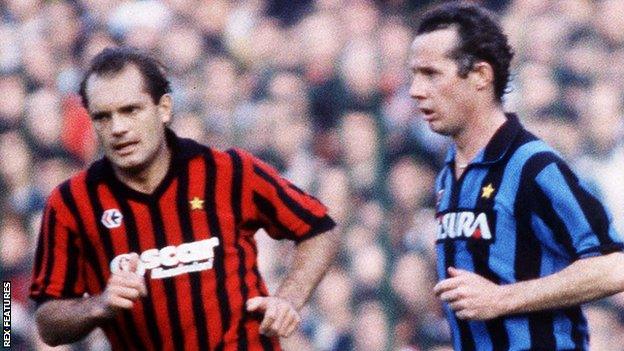
Playing against former Arsenal midfielder Liam Brady in the Milan derby
He flourished in Scotland alongside England colleagues such as Terry Butcher and Gary Stevens, becoming a hugely popular figure with the Ibrox support. He won the Scottish title and League Cup, scoring a spectacular volley in a memorable 5-1 Old Firm win at home to Celtic.
Wilkins returned to England for a four-year spell at Queen's Park Rangers. He had a one-game stay at Crystal Palace, his time there curtailed by a foot injury, before returning to Loftus Road as player-manager, taking over from Gerry Francis in November 1994.
He enjoyed a measure of early success but left in September 1996 after the club were relegated, his cause not helped by the sale of leading scorer Les Ferdinand to Newcastle United in the 1995 close season.
Wilkins finished off his playing career with short spells at Wycombe Wanderers, Hibernian, Millwall and Leyton Orient.
An England mainstay
Wilkins was trusted by a succession of England managers such as Ron Greenwood and Bobby Robson to be the foundation of their sides - but his international career was often characterised by frustration.
He played in the European Championships in Italy in 1980, scoring a brilliant lob in the opening 1-1 draw with Belgium, but England failed to progress from the group, their prospects damaged by a 1-0 loss to the hosts.
Archive: Wilkins sees red in Mexico
He played in every game in the 1982 World Cup in Spain but in a tournament that had two group stages, England failed to progress from the second phase after goalless draws against West Germany and Spain.
Greenwood's side were unbeaten but returned home frustrated after a campaign undermined by injury to two key players, Kevin Keegan and Trevor Brooking.
The greatest pain was arguably still to come for Wilkins at the World Cup in Mexico four years later.
Wilkins played in the opening loss to Portugal and was then sent off following an uncharacteristic show of temper in the goalless draw against Morocco in Monterrey.
He was shown a red card for hurling the ball in the direction of Paraguayan referee Gabriel Gonzalez.
Wilkins never regained his place after a two-match suspension as England went out to Argentina in the quarter-final and his last international appearance came just a few months later - a 2-0 victory over Yugoslavia in a European Championship qualifier at Wembley in November 1986.
The trusted lieutenant
Wilkins returned to management at Fulham in 1997, with former England colleague Keegan as "chief operating officer" at Craven Cottage under the new big-spending regime of Mohamed Al-Fayed.
He took Fulham into the Second Division play-offs but was sacked before the first play-off game took place, with Keegan taking control.
The rest of his career was mainly as a loyal backroom team member and assistant manager, first with Gianluca Vialli at Chelsea and Watford and then with Dennis Wise at Millwall.
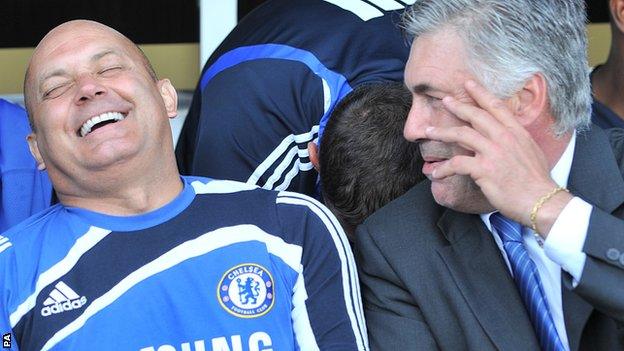
Wilkins was a popular right-hand man to several Chelsea managers
Wilkins returned to Chelsea in September 2008 as assistant to Brazil World Cup winner Luiz Felipe Scolari and, after Scolari was sacked, stayed on as right-hand man to interim manager Guus Hiddink as the Blues picked up the FA Cup in 2009.
He was also at Carlo Ancelotti's side for the Premier League and FA Cup double in 2010 before it was announced in November 2010 that his contract would not be renewed, bringing an unexpected end to his Chelsea career.
In his book 'The Beautiful Games Of An Ordinary Genius', Ancelotti wrote: "Ray is one of those select few, always present, noble in spirit, a real blue blood. Chelsea flows in his veins… without him we wouldn't have won a thing."
He then had short spells back at Fulham and in charge of the Jordan national team before he was sacked alongside manager Tim Sherwood at Aston Villa.
Fighting demons and illness - and a popular pundit
Wilkins had darker moments in his latter years, but remained a respected figure on the media circuit and at matches as he pursued a career in punditry on radio and television.
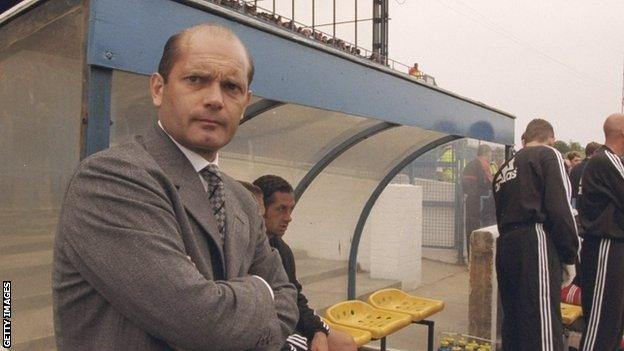
Wilkins became a common and popular sight in the dugout once his playing days were over
He suffered poor health, including ulcerative colitis. He also had double bypass heart surgery in July 2017.
Wilkins went through a five-week rehabilitation programme in the Priory Hospital in Woking after he was banned from driving for four years for drink-driving in 2016, admitting he had struggled with alcohol problems.
After he suffered his cardiac arrest, former Chelsea and England player Frank Lampard called Wilkins "an absolute gentleman" while heartfelt goodwill messages flooded in from around the world from former clubs and those who had played and worked with him.
He was back on the radio and was a regular at games this season, where his warm, outgoing personality continued to make him a popular figure among the media and his former playing colleagues.
Wilkins leaves his wife, Jackie, and children Ross and Jade.
- Published4 April 2018
